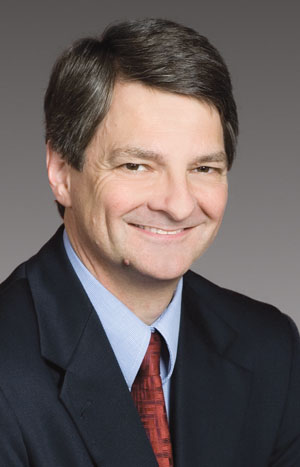Ontario’s new attorney general is one of London’s top criminal lawyers, say his colleagues.
Chris Bentley, former minister of colleges, training and universities, has been named the new attorney general of Ontario, following a cabinet shuffle last week that will see former attorney general Michael Bryant become minister of aboriginal affairs and government house leader.

Ontario Premier Dalton McGuinty announced the move last week, bringing Bentley, a labour and criminal lawyer, into the new role.
Before he was elected as MP for London West in 2003, Bentley, 51, practiced with the London firm Bentley & Leroy, representing clients at trial, on appeal, and before various boards and tribunals. He also authored the book Criminal Practice Manual: A Practical Guide to Handling Criminal Cases, in 2000.
Called to the bar in 1981, Bentley graduated from the University of Toronto faculty of law in 1979 and went on to practice for 23 years and teach part-time at the University of Western Ontario law school for 10 years, where he helped to establish a law school careers office.
He was also the first chairperson of Neighbourhood Legal Services (London & Middlesex), a London legal clinic established in 1985, and has lectured at several continuing legal education courses for judges, Crowns, the police, and defence counsel.
Bentley was one of the top criminal lawyers in London and is very respected by his peers, says Cathy Bruni, vice president of the Middlesex Law Association.
“He was very well known here as a very respected criminal lawyer,” she says.
Greg Goulin, president of the Ontario Bar Association, says the association is excited about the appointment. What is important, he says, is that Bentley is a “consensus builder,” as is federal Minister of Justice Rob Nicholson, and they should work well together. He says he is sure the OBA will be meeting with Bentley after he is briefed in his new portfolio.
Goulin says he was fortunate to have met and worked with Bryant when he became president of the OBA this year, and says his new appointment is an excellent one, as he has a reputation for being energetic, getting at the source of issues, and trying to resolve them.
Several initiatives that began during Bryant’s four-year tenure as attorney general include the new Law Commission of Ontario, launched earlier this year, as well as the establishment of the province’s first major crimes courtroom at 361 University Ave. in Toronto, and the creation and expansion of the guns and gangs taskforce.
The Ontario Court of Appeal started webcasting some of its proceedings following a recommendation from the panel on justice and the media. Last year, the government also passed the Access to Justice Act, which regulated the paralegal profession in Ontario, as well as Bill 107, which will transform the roles of the Ontario Human Rights Commission and Ontario Human Rights Tribunal.
Also currently underway is the civil justice reform project, being led by former Ontario associate chief justice Coulter Osborne, who will propose options to reform the civil justice system to make it more accessible and affordable for Ontarians. Osborne has already provided the government with his report and recommendations, and these are currently being translated.
A review of Legal Aid Ontario is also in progress, as late last year the government announced it had retained Osgoode professor John McCamus to update his 1997 “Blueprint for Publicly Funded Legal Services.” The review, now chaired by University of Toronto Prof. Michael Trebilcock following McCamus’ appointment as chair of legal aid last summer, will look at regulations, tools to maximize effective administration and good governance of the legal aid system, and will examine alternatives to the current tariff process.
While the OBA notes that it looks forward to working with the new attorney general as he enters the implementation phase with these reports, he will also likely be handling the continuation of other projects launched by Bryant, such as the final touches of paralegal regulation, says Goulin.
Bentley will also be facing several ongoing issues such as legal aid funding, mental-health issues in the court system, and access to justice, which will be a major issue once he gets settled into his new position, says Goulin.
“There’s a lot of legislation coming in federally and this will require a lot of court time, which means basically . . . three things: we have to have enough judges, we have to have enough Crowns, and we have to have the defence counsel there, which takes funding on all sides,” he says.
Bentley is keenly aware of the issues, says Goulin, and his former role as chair of Neighborhood Legal Services shows his direct involvement with access to justice concerns, says Goulin. His reputation among the bar, he adds, is of a reasonable, competent, knowledgeable person who is concerned.
“We’re quite fortunate in his appointment. This man has proven his ability in his labour portfolio let alone with regard to universities,” he says. “The ability to bring in reforms is not unknown to him and that was his, shall we say, specialty in practice when he did practice,” he says. Bentley is not a newcomer to the field, says Goulin, adding that he uses the criminal law textbook written by the new attorney general.
Bruni says that at the forefront will be the concern for open access to the system, while Bentley also has the background in criminal law to be able to handle the issue of guns and gangs effectively, she adds.
“We hope to continue with Mr. Bentley what we started with Mr. Bryant,” says Goulin.

 Ontario Premier Dalton McGuinty announced the move last week, bringing Bentley, a labour and criminal lawyer, into the new role.
Ontario Premier Dalton McGuinty announced the move last week, bringing Bentley, a labour and criminal lawyer, into the new role.